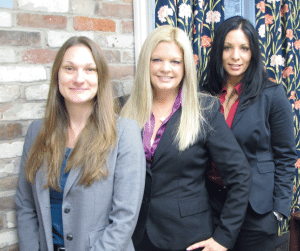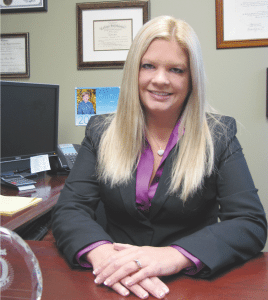
Woman’s World
Royal LLP Helps Clients Get Down to Business
It’s an accepted trope that society has become more litigious, Amy Royal says, but not every business understands the implications of that fact.“When someone loses a job, nine times out of 10, they don’t accept ownership or think it was anything they did, but it must be someone else’s fault,” said Royal, founding partner of Royal LLP, a Northampton-based, management-side labor and employment law firm.
“Unfortunately, our system makes it very easy for disgruntled employees to file claims against their former employer,” she continued. “You can go to a state agency and file for free. You can go to an attorney and engage their services without any real out-of-pocket costs. Because of that, numerous frivolous claims are filed every single day. A lot of people who may have engaged in misconduct are still able to take advantage of the system. It impacts everyone.”
Therefore, one service Royal provides its business clients is helping them to be proactive in a litigious world and develop practices that will save money and headaches in the long run.
“Documentation is key — and adequate documentation,” Royal told BusinessWest. “On the litigation end of things, when I get a case, I meet with the client and hear about how awful this employee was, stories of acts of misconduct, times they didn’t show up for work, and I think this is going to be a slam dunk. And I ask to see the personnel file, and there’s nothing in there to support that, or the documentation isn’t very good.”
So Royal teaches supervisors not only the importance of creating a paper trail, but how to write disciplinary actions that will stand up to scrutiny later on. “You’re writing it for the future — for courts, judges’ eyes, investigators’ eyes. What information do you want to put in there? It goes back to the journalistic principles of who, what, when, where … just stick to the facts.”
That’s one example of how Royal LLP aims to be a partner with its clients, not just a resource they turn to when they’re in legal hot water.
This month marks the five-year anniversary of the firm, which was launched first as Royal & Munnings — with Aimee Munnings, who now runs a large nonprofit organization in Washington, D.C. — and later as Royal & Klimczuk, with Kimberly Klimczuk, who currently works at Skoler, Abbott & Presser, P.C. in Springfield.
Since operating under her solo name, Royal has built a law firm of nine attorneys and has largely realized her initial goal “to create a pre-eminent management-side labor and employment law firm that would support the growth of women and minority attorneys.” Five full-time attorneys are women, and one is African-American.
“It’s really been my mission to provide these opportunities to women and minorities, primarily because, when I started my career, I didn’t see that support, or depth of support,” she recalled. “What prompted me in particular was a report that came out of MIT, around 2007 or 2008, that basically talked about the fact that women attorneys were leaving the private practice of law in large, startling numbers.”
She wondered why, then found the answer. “The women that MIT polled, who took part in the study, said there was no work-life balance in the law firms; they just didn’t support it. I thought, how can that be, especially with the technology today? With the way law firms are structured, a lot of the work can be done at any time, so why is that happening? There must be a solution.”
For this issue and its focus on law, BusinessWest takes an in-depth look at that solution and how this firm intends to stay on its current pattern of consistent growth.
Case in Point

Amy Royal (center, with Karina Schrengohst, left, and Tanzania Cannon-Eckerle) says she set a goal early on of establishing a law practice where women attorneys could succeed and still maintain a healthy work-life balance.
“I’m a firm believer that, if you spend a little bit of money now, it goes a long way to prevent headaches later,” she said. “While I think I’m really good at putting out fires for clients and problem solving and coming up with innovative solutions immediately, from a business perspective, that’s not the way you want to operate. You don’t want to always be reacting.”
That applies to a wide variety of situations, not just dealing with disgruntled ex-employees.
“For example, fairly recently, I had a company that has always been union-free, and hopefully will continue to be union-free, but they’ve had some union chatter in their organization, and once that train gets going, it’s harder to stop.” So she worked with the client on strategies to reduce the risk of unionization.
“Obviously, there are steps you can take to prevent a union from successfully coming through the door,” Royal said, “but there are many steps you can take before they even arrive, and it’s so much harder to stop it once it’s already on that course than to think about the steps you want to take over the next year, two years, three years to prevent it from ever happening.”
The launch of her own law firm coincided with the financial collapse of 2008, and building a practice over the next five turbulent years has given Royal some strong ideas about what clients want.
“It got me thinking about the future of the law and trends in the law and the delivery of legal services,” she said. So, this year, the firm introduced a flat-fee system that can be structured in several different ways. “I do believe the trend is move away from traditional billable hours, because in what other field do you purchase a product without knowing what the price is going to be? It’s only human that people want certainty in their billing; they want to know what they’re paying for. So we’ve come up with different flat-fee programs; one is all-inclusive and encompasses litigation as well.
“Even some law firms that may be on the cutting edge and have decided to provide some flat-fee services, I don’t think they have done that in the context of litigation because litigation can be so unknown,” she continued. “However, since we have this niche in management-side labor and employment law, we’re able to predict the costs, and we’re able to provide a very reasonable flat-fee arrangement to clients, similar to what you get with insurance, where you share in the risk, so to speak.”
Navigating a Minefield
The risk for businesses comes in many forms, especially at a time when employment law is becoming more complex and tilting, in many ways, toward broader workers’ rights. For instance, the Americans with Disabilities Act of 1990 was amended in 2008 to define virtually anyone with any form of physical and mental impairment as ‘disabled,’ granting them added protection in the workplace.
“That has obviously created a lot of issues and uncertainties,” Royal said. “It’s also an area our state agencies and the Massachusetts Commission Against Discrimination have focused in on. They’ve taken the position that everyone is disabled, and therefore your company needs to be providing accommodations and engaging in dialogue with employees about what accommodations you can give them.”
Those issues can, frankly, be confusing for businesses, which often need a consultant like Royal LLP to train them in how to engage in that dialogue.
The training she and her fellow attorneys provide often takes the form of role-playing exercises with a company’s supervisory staffers, which can be a more effective learning tool than a dry lecture. “We’ve tried to make our trainings very practical and very interactive,” she said.
Other expertise the firm offers has nothing to do with litigation or employee grievance. For example, it helps companies create succession plans — not just for key executives, but for other critical staffers, such as a program manager for a nonprofit. “Do you have a plan in place to deal with the loss?”
The broad range of issues involved in employment law appeals to Royal, as do the long-term relationships she has built hammering out those issues for clients.
“We end up being their trusted business confidant, and that’s the really exciting thing,” she said. “We get to wear different hats — we get to be their advocate in court and litigate hard and aggressively for the client; we get to be their counsel that advises and helps them make plans that are both business-based and have legal implications; and we also get to be their educator, get to train them and their staff in how to stay out of trouble, or at least miminize their exposure to legal risk.”
The steps companies need to take might seem obvious, she told BusinessWest, but aren’t always followed in the day-to-day struggle to survive in a down economy.
“A lot of what I hear from management is there’s not enough time in the day to document issues, and I’m sensitive to that, because I run a business, too,” Royal said. “Again, if you go back to the training and the journalism approach of who, what, when, where, if you jot that down on a piece of paper, it’s not going to take you all that long, and it’s going to save you time in the long run, when you’re embroiled in litigation.”
Community Ties
As she builds the firm’s reputation in area communities — it has a second office in Springfield — Royal said it’s equally important to stay involved in civic life outside the workplace.
“Something I hope to instill in the other attorneys is being active in the community and giving back to the community,” she said. “It’s so important and so beneficial to everyone. So we do have a lot of our staff active in the community.”
Specifically, Royal serves on four different boards and chairs the United Way of Hampshire County, while the other attorneys are active on various boards or nonprofits. “It’s really important to me, and something that has really engaged the attorneys here and gets them to connect with our clients and the community in a different way.”
That’s the kind of work-life balance she knew was possible when she set out with a goal to establish, as she puts it, the pre-eminent labor and employment law firm in this region.
“I do expect additional growth, especially in the Connecticut arena,” she told BusinessWest. “Three of our attorneys are admitted to practice there, and I do have a Connecticut client base.”
Royal LLP has come a long way in just five years, but that doesn’t surprise its founder.
“That was my hope and my vision and my push. I’ve worked really hard to get the Royal name out there in every way I possibly could. So I’m really pleased, but I continue to make that push and want to continue to grow.”
Joseph Bednar can be reached at [email protected]






